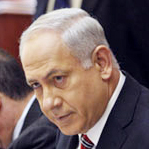Israel's decision to include holy sites in the occupied West Bank in a list of "national heritage sites" it wants to refurbish has sparked an Arab-Israeli war of words.
Prime Minister Benjamin Netanyahu called the widespread Palestinian - and Arab - condemnation of the move "hypocritical."
"This is a mendacious and hypocritical campaign. The State of Israel is committed to freedom of religion for worshippers of all faiths at the holy places and thus it acts in practice," his office said in a statement sent to the German Press Agency dpa Wednesday.
The Israeli premier issued the statement after Palestinian President Mahmoud Abbas denounced the Israeli move as a "provocation," which he warned could unleash a "religious war."
Netanyahu's cabinet on Sunday approved a plan for the preservation and rehabilitation of some 150 sites throughout Israel, at a cost of almost 600 million shekels (more than 150 million dollars).
Following right-wing pressure, the premier, of the nationalist, but mainstream, Likud party, gave a last-minute order to include the Cave of the Patriarchs and Rachel's Tomb, on the West Bank.
The Cave of the Patriarchs, in Hebron, is an ancient, fortress-like limestone building - today divided into a mosque and a synagogue - over the caves. According to tradition, the Biblical couples of Abraham and Sarah, Isaac and Rebeccah, and Jacob and Leah were buried there.
Jews regard it as their second holiest site, after their ruined Biblical Temple in Jerusalem, but it is also highly revered by Muslims and Christians.
Rachel's Tomb, in nearby Bethlehem, is the traditional grave site of the Biblical matriarch Rachel, widely seen as the third holiest site in Judaism. Muslims have a mosque there, called Bilal.
Hebron's Cave of the Patriarchs was divided into strictly secured, separate sections for Muslim and Jewish worshippers, after the 1994 Baruch Goldstein massacre, in which a Jewish extremist shot dead 29 Muslims and injured scores at prayer there.
The Israeli decision sparked clashes in Hebron on Monday and Tuesday, with angry Palestinians burning tires and hurling rocks at Israeli soldiers guarding the Israeli-controlled part of the divided city.
They said they were worried the move was an attempt to "annex" the holy site to Israel.
Netanyahu's office said Israel only wanted to renovate the Jewish section of the building, noting the entrance plaza and the path leading to the Islamic prayer room were already being refurbished.






